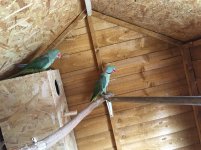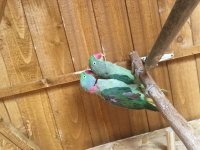Parroteet18
New member
- Sep 6, 2018
- 3
- 0
Hello there guys I have 2 Alexandrine’s Male And Female the Male is 3 Years and the female 2 years they have been together for approx 5 months and they have not bonded at all but stay away from each other the female is more dominant as when they both go to the food bowl the female starts to bite the male aggressively the male however never reacts but stays calm and goes away,
They live in the shed with a strong mesh window so they can get a bit of air, and they have perches that they can fly to they have space to fly around so they can be as healthy as possible their diet is : 1 and a half bowl of mixed seeds and a bowl of fruit a day they however the male has been losing a lot of feathers lately it looks like a heavy molt he started molting as soon as the female finishes
I put a next box in the shed and they don’t go in I only see the male siting on top of the box
Do you guys have any advice on to breed my Alexandrine’s
Any advice would be much appreciated.
They live in the shed with a strong mesh window so they can get a bit of air, and they have perches that they can fly to they have space to fly around so they can be as healthy as possible their diet is : 1 and a half bowl of mixed seeds and a bowl of fruit a day they however the male has been losing a lot of feathers lately it looks like a heavy molt he started molting as soon as the female finishes
I put a next box in the shed and they don’t go in I only see the male siting on top of the box
Do you guys have any advice on to breed my Alexandrine’s
Any advice would be much appreciated.

